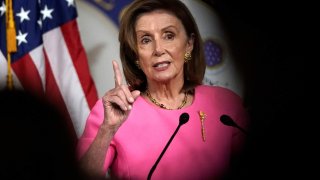
- The House of Representatives on Tuesday approved a bill to raise the U.S. debt limit, the final legislative hurdle to averting a first-ever national default.
- The bill now travels to President Joe Biden's desk for his signature and enactment. It will allow the Treasury Department to pay the nation's bills until early December.
- The legislation is the result of an deal between congressional Democrats and Republican leader Mitch McConnell, and would lift the debt ceiling by $480 billion.
The House of Representatives on Tuesday approved legislation to raise the U.S. debt limit, the final legislative hurdle to averting a first-ever national default that was otherwise expected to occur next week.
The bill, passed by the Senate last week, now travels to President Joe Biden's desk for his signature and enactment. He is expected to sign it later this week and likely Wednesday.
The legislation, which cleared the House with a party-line vote of 219-206, is the result of an agreement between congressional Democrats and Senate Minority Leader Mitch McConnell, R-Ky., and would extend the debt ceiling by $480 billion.
Get DFW local news, weather forecasts and entertainment stories to your inbox. Sign up for NBC DFW newsletters.
The current national debt is $28.4 trillion and would be permitted to rise to about $28.8 trillion.
While the president is widely expected to sign the bill, failure to do so would result in economic calamity by Oct. 18, Treasury Secretary Janet Yellen has warned.
The president's top economic advisor told CNBC earlier in October that she would "fully expect" a U.S. recession if the government ran out of ways to pay off its bills and triggered an unprecedented default.
Money Report
Debt ceiling suspensions or extensions do not authorize new government spending, but allow the Treasury Department to pay for appropriations Congress has already approved.
The debt limit extension is expected to allow the government to cover its expenses at least through Dec. 3, House Speaker Nancy Pelosi, D-Calif., said during a press conference Tuesday morning. Some recent reports suggest the $480 billion increase could last Congress further into December.
Even if the so-called drop-dead date is later in December, it won't mean much to lawmakers, said Raymond James policy analyst Ed Mills.
Mills explained Tuesday morning that McConnell designed the $480 billion plan to force Congress into addressing the debt limit again before the legislature breaks for the holidays.
"This is structured in a way that the debt limit needs to be dealt with in December to the greatest extent possible," Mills said when reached by phone.
"Is it later in December? Is it early January? It's semantics at that point," he continued. "When Congress is done in December, they're going to want to go home and not come back to a ticking time bomb of an issue."
The debt-limit agreement between McConnell and Senate Majority Leader Chuck Schumer, D-N.Y., came as a breakthrough after weeks of negotiations.
Republicans want Democrats to pass a longer-lasting borrowing limit increase through budget reconciliation. Reconciliation would allow Democrats to pass a debt limit hike with a simple majority vote and circumvent a GOP filibuster.
The downside for Democrats is that reconciliation will force them to assign a dollar figure to the debt ceiling and make them appear responsible for an outsized portion of the national debt ahead of the 2022 midterm elections.
The GOP also argues that the chore of extending the limit should rest with Democrats since the Biden administration is attempting to use the same process to pass trillions in climate and anti-poverty spending.
If McConnell stands by his threat to withhold Republican support, Democrats will be left with few options other than reconciliation because the Senate is split 50-50.
Most bills in the Senate require at least 60 votes thanks to the threat of a filibuster. Still, a compromise on the borrowing cap likely comes as a relief to both parties.
Democrats buy themselves a couple months to sort out their intraparty disagreements over their multitrillion-dollar health, education and climate package and pass a parallel infrastructure bill in the House.
Republicans believe the short-term ceiling deal will bind Democrats to a debt ceiling increase in December.
McConnell claimed in extending his compromise to Democrats last week that, by December, Biden, Schumer and House Speaker Nancy Pelosi, D-Calif., will be unable to claim they lacked enough time to manage both the debt limit and their policy agenda.






